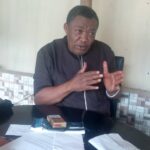By Ekunkonye Junior
Abuja
The Founder/CEO, Omas World of Glamour Limited, Dr (Mrs) Joy Ezeike had over the weekend examined the performance of President Ahmed Bola Tinubu of Nigeria in his one year in office.
Omas World of Glamour is a media outfit that has first and second head offices in Port Harcourt, Rivers State and Lekki, Lagos State respectively, and offices in Abuja and some other states in Nigeria and outside the country.
President Tinubu has recently marked his one year in office, which witnessed commissioning of projects within and outside the FCT, as well as industrial strike by organised labour, whose discussion between the FG and the organized labour is still on going.
Having been over the time been observing and examining Tinubu’s performance, she spoke on his economic policy, security, women inclusion in government and the ongoing labour – FG minimum wage impasse.
According to her, in line with Tinubu’s Renewed Hope Agenda (RHA), his administration has made remarkable reforms, which according to her, include but, not limited to his economic policy. He stated that Mr President, in May 29, 2023, gave a clear indication of his administration’s readiness to overhaul Nigeria’s economy and immediately announced the removal of fuel subsidy.
She said subsequently, he made the following economic changes, among which was his decision to float the Naira against the Dollar at the foreign exchange market, a decision which, according to her was based on the anticipation that doing so would weaken the premium (discrepancy) existing between the official market and the parallel market. The decision, she went on, led to the devaluation of Naira by about 200% against the greenback, adding that the floating of the Naira has had a huge impact on the economy, particularly inflation. She stated that the inflation was about 33.6 percent at present, which according to her, means that Nigerians are paying more for commodities and foods.
Furthermore, the rise in food prices is over 40 percent, in addition to other essential commodities that make life worthwhile. The rapid removal of fuel subsidies and the decision to float the naira have led to a substantial spike in general prices of commodities.
Another was electricity subsidy removal. On this she said: “As Nigerians struggle to find their balance due to the fuel subsidy removal, the government announced electricity subsidy removal. The Nigerian labour congress is currently demanding for a reversal of the hike in electricity tariff. As anticipated, the increase has been met with opposition and agitation for reversal from the organised labour, and activists. The Tinubu administration embarked on this particular electricity subsidy removal as part of his economic reforms.”
Added was banks recapitalization, and on that she had this to say: “As part of his economic policies again, just recently, the Central Bank of Nigeria (CBN) announced an upward review of the minimum capital requirement for banks.The recapitalization is pegged at N500 billion for banks with international authorization, N200 billion for commercial banks holding and N50 billion for merchant banks. Experts have said that a bigger capital base will empower Nigerian banks to guarantee higher levels of credit in the economy and ultimately create higher income. Others include the tax reform, and a single window to ease import-export transactions, to mention but a few.
Airing her views on the areas of security, Dr Joy Ezeike stated thus: “Recall that the National Security Adviser, NSA), Malam Nuhu Ribadu, recently shared a substantial update at a High-Level African Counter-Terrorism Meeting in Abuja, where he revealed that the number of terrorism-related deaths in Nigeria has dropped, from a shocking 2,600 per month to less than 200 at that moment, marking a substantial decrease. The President, Bola Ahmed Tinubu demonstrated his administration’s steadfast commitment to defense and security which yielded the anticipated success.”
She continued: “This success can be accredited to the novel strategic plans currently being implemented by the FG with the support of the military, intelligence communities and other security outfits. Part of the efforts include a sizeable budget allocated to the defence and security sector to procure military hardware and other equipment necessary for fighting criminals. You will recall the incessant cases of kidnapping in the FCT, but all of those are now stories. Just recently, in the quest to boost troops’ operational capacity and enhance national security, the Defence Headquarters has taken delivery of at least 20 newly acquired armoured personnel carriers, APCs, donated by the FG through the Ministry of Defence.”
“These armoured personnel carriers will provide our troops with enhanced protection and mobility, enabling them to carry out their duties more effectively in safeguarding our nation’s sovereignty. The present administration’s readiness to eradicate the issues of insecurity and ensure the security of lives and properties is quite commendable. However, more is still expected, as the nation needs grow pass the era of insecurity.
Hailing Mr President in the area of women inclusion government, she observed rhus: “Women’s inclusion in governance has been massively advocated. Nigeria, like many countries, is faced with the underrepresentation of women in both elective and appointive positions. Tinubu administration is conscious of the need for inclusive governance. The president has made strides in appointing female ministers, showcasing a modest yet substantial increase compared to the previous administration. Tinubu’s administration commitment to driving inclusion is evidenced by the appointment of eight female ministers in his administration, which is a significant increase compared to the previous government.
“The following list provides the names and roles of the eight female ministers serving in Tinibu’s government: Minister of State, Labour and Employment, Nkiruka Onyejeocha;
Minister of Humanitarian Affairs and Poverty Alleviation, Bette Edu;
Minister of Arts, Culture and the Creative Economy, Hannatu Musawa;
Minister of State, Federal Capital Territory – Mahmoud Mariya
Ibrahim; Minister of State, Police Affairs, Imaan Sulaiman;
Minister of Tourism, Lola Ade – John; Minister of Industry, Trade and Investment, Doris Uzoka – Anite and;
Minister of Women’s Affairs, Uju Kennedy Ohanenye.
The appointment of eight female ministers by President Tinubu is a sign that the present administration is indeed committed to women’s inclusion in governance.”
Mrs Ezeike Al’s had a n insight in the his government’s discussion with organised labour, by saying: “President Bola Tinubu on Tuesday, received a briefing from a delegation of the federal government regarding the discussions with organized labour on the new minimum wage. The meeting had in attendance members of the Tripartite Committee on New National Minimum Wage.Top government officials who were present at the State House for the briefing included Minister of Finance, Wale Edun; Minister of Budget and Economic Planning, Atiku Bagudu; Minister of State for Labour and Employment, Nkeiruka Onyejeocha; and the Chief Executive Officer of the Nigeria National Petroleum Company limited, Mele Kyari.
“The meeting with the Mr President was held an hour before the resumption of negotiations between labour and government shortly after the Nigeria Labour Congress (NLC) and the Trade Union Congress (TUC), announced the suspension of their industrial action to allow for further negotiations with the government.
Recall that the negotiation for new national minimum wage has been going on for several months without a tangible agreement. The FG had earlier moved from N48, thousand, N57 thousand and N60 thousand respectively. President Tinibu had expressed readiness to give a minimum wage higher than N60 thousand and had directed the minister of finance to work out the template for the payment of the new national minimum wage. So, yes the president is indeed committed to a better workers’ welfare in Nigeria.”












